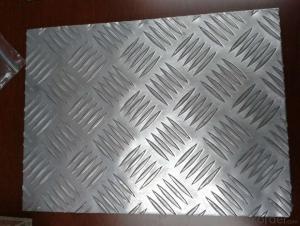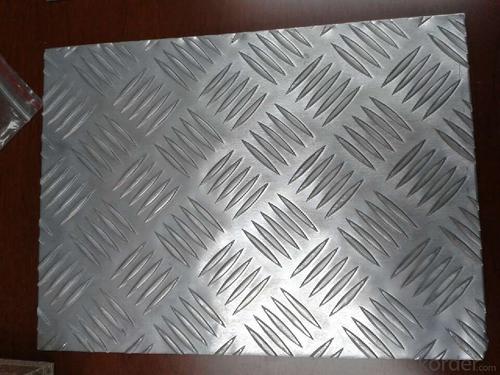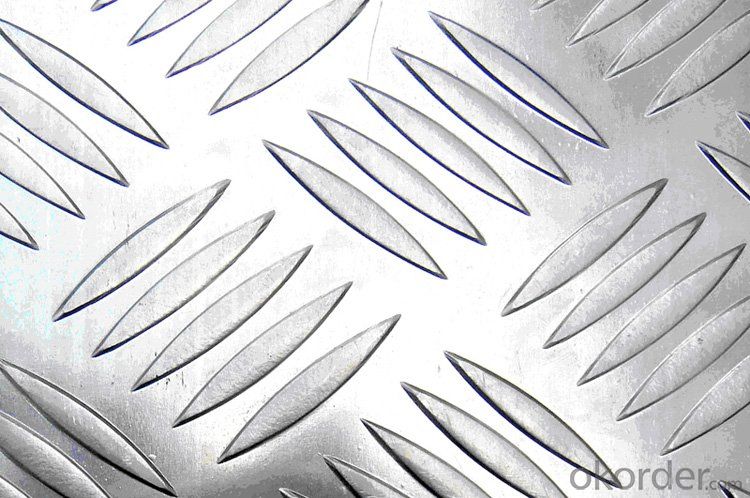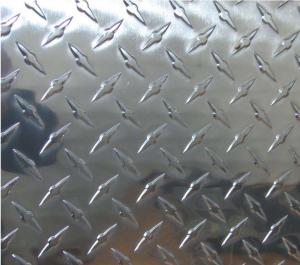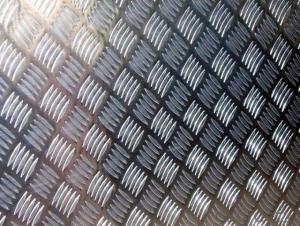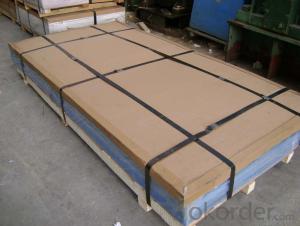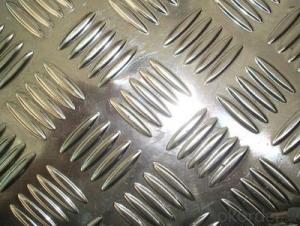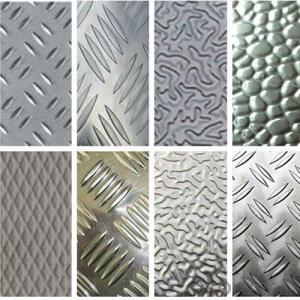Coil Sheet Aluminum Anti-Slipper Diamond
- Loading Port:
- Shanghai
- Payment Terms:
- TT OR LC
- Min Order Qty:
- 4 m.t.
- Supply Capability:
- 100000 m.t./month
OKorder Service Pledge
OKorder Financial Service
You Might Also Like
Specification
1.Structure of Aluminum Sheet Metal Anti-slipper Diamond:
Mill Finished Aluminum Coil is designed for many field such as electronics, instruments, lighting decoration, packing industry, and house decoration, curtain wall, honeycomb-core panel, sandwich panel, aluminum composite panel, aluminum composite pipe etc.. Mill finished aluminum coil for is hard and everlasting under the blazing sun. You can choose the alloys as your habitation and we will do our best to meet your requests.
2.Main Features of the Aluminum Sheet Metal Anti-slipper Diamond:
• Smooth surface
• High manufacturing accuracy
• High strength of extension and yield
• Well packaged
• No marks, no scratch, no excessive oil
3. Aluminum Sheet Metal Anti-slipper Diamond
Alloy: | AA1050,1060, 1100, AA3003, 3005, 3015, 5052, 5754, 5083,8011, etc |
Temper: | H14/16/18/22/24/32,HO etc |
Thickness: | 0.2-100mm |
Width: | 100mm—2300mm (Can be slitted) |
Standard: GB/T 3880-2006 ASTM B-209
4. Production of Aluminum Sheet Metal Anti-slipper Diamond
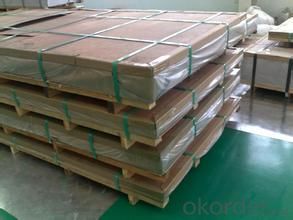
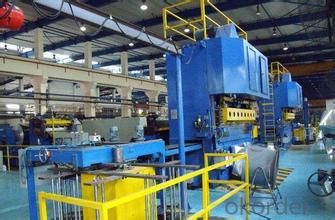
5.FAQ of Aluminum Sheet Metal Anti-slipper Diamond
We have organized several common questions for our clients,may help you sincerely:
① How about your company?
A world class manufacturer & supplier of aluminum coil and alloy blanks. Aluminum production base is comprised of 18 aluminum annealers, 10 coil and foil mills, 4 continuous production lines, 2 hot rolling production line and 3 prepainted lines.
Export 5000 tons per month to Asia, America and Middle East. Always do the best for our clients.
②Can you guarantee the quality of the products?
We are responsible for the quality of materials to get a long-term cooperation with clients in a reasonable period of time and we are glad to arrange and coordinate any third party inspection for you.
③What is the delivery time after purchase?
35 day after receiving client’s deposit or correct LC
- Q: What substances are used to make aluminum coils?
- <p>Aluminum coils are made from aluminum, a lightweight and malleable metal with the chemical symbol Al. They are typically produced from high-purity aluminum or aluminum alloys, which may include small amounts of other elements to enhance specific properties such as strength, durability, or resistance to corrosion. Pure aluminum is soft and lacks strength, so alloys are often used to improve these characteristics for various applications.</p>
- Q: What is the maximum coil weight for aluminum coils?
- The maximum coil weight for aluminum coils can vary depending on various factors such as the thickness and width of the coil, as well as the specific alloy being used. Generally, the maximum coil weight for aluminum coils ranges from around 5,000 to 25,000 pounds. However, it is important to note that these figures are approximate and can differ depending on the manufacturer's guidelines and equipment capabilities. Additionally, it is always recommended to consult the manufacturer or supplier for specific coil weight limitations to ensure safe handling and transportation.
- Q: hello I'm building a TIG welder and have found the output from my stick welders to be not so good for aluminum(60 Hz on one). I've heard that high frequency AC is the way to do AL but am not sure what constitutes high. I do have a nice miller gas driven welder also that is maybe triple the frequency of my line driven one but still had issues with it. does anyone know of an actual # ? I may be able to build an inverting PWM supply eventually to do this but am not sure what I would need it to do. does anyone have any data that might help? any data/tips about aluminum would be appreciated, thanks in advance. FYI I do understand why AC works so much better on AL, what with the oxides that are always present.
- The High Frequency used in aluminum is for the starting and stabilizing of the ac wave. All the h/f will do is allow you to start the arc without touching the tungsten to the work and stabilize the arc itself. The h/f does not pertain to the alternating current frequency (50 - 60 Hz). The ac current does the cleaning of the aluminum to some degree (not eliminating proper prep and cleaning before weld). You could buy a high freq add on unit that could help, check with your local welding supplier or look it up on line. Edit -- Here's a thought go to some of the welding power supply websites and find a manual on a tig machine and see if they have a schematic on the high freq. hidden within the service manual. You could then get an idea of how they did it.
- Q: How do aluminum coils contribute to recyclability in the construction industry?
- Aluminum coils play a crucial role in enhancing recyclability in the construction industry due to their inherent properties and characteristics. Firstly, aluminum is a highly recyclable material, meaning it can be recycled repeatedly without losing its quality or physical properties. This makes aluminum coils a sustainable and eco-friendly choice for construction projects. The recyclability of aluminum coils helps reduce the environmental impact associated with the construction industry. By choosing aluminum coils, construction companies can contribute to the conservation of natural resources and the reduction of energy consumption. Recycling aluminum requires significantly less energy than producing it from raw materials, resulting in a substantial reduction in greenhouse gas emissions and carbon footprint. Moreover, the use of aluminum coils in construction facilitates the dismantling and deconstruction processes, making it easier to separate the aluminum components from other materials. This efficient separation allows for the effective recycling of aluminum coils, ensuring that they can be transformed into new products or materials. Additionally, aluminum's durability and resistance to corrosion make it a suitable choice for construction applications. Its long lifespan reduces the need for frequent replacements, further minimizing waste generation and the consumption of raw materials. When the time comes to replace or renovate a building, the aluminum coils can be easily collected, recycled, and reintroduced into the manufacturing cycle, closing the loop of the material's lifecycle. In summary, aluminum coils significantly contribute to recyclability in the construction industry. Their high recyclability, low energy requirements for recycling, and ease of separation during deconstruction make them an environmentally friendly choice. By utilizing aluminum coils, the construction industry can promote sustainability, reduce waste generation, and conserve natural resources, ultimately leading to a greener and more circular construction sector.
- Q: Are there any specific guidelines for the handling of aluminum coils?
- Yes, there are specific guidelines for the handling of aluminum coils. These guidelines typically include proper lifting techniques, the use of appropriate equipment such as cranes or forklifts, and ensuring that the coils are stored in a clean and dry environment to prevent corrosion. It is also important to handle the coils gently to avoid any damage or deformation.
- Q: Can aluminum coils be used in heat exchanger fins?
- Indeed, heat exchanger fins can utilize aluminum coils. Aluminum is widely preferred for heat exchangers owing to its remarkable thermal conductivity, lightweight properties, and resistance to corrosion. By incorporating aluminum coils into heat exchanger fins, the transfer of heat between two fluids becomes highly efficient, making it an ideal material for this specific purpose. Moreover, aluminum coils can be effortlessly shaped into different fin configurations, which allows for design flexibility and maximizes the surface area for heat transfer. All in all, aluminum coils are commonly employed in heat exchanger fins to boost heat transfer efficiency and enhance the overall performance of the heat exchanger system.
- Q: Are aluminum coils resistant to chemicals?
- Yes, aluminum coils are generally resistant to chemicals. Aluminum has a natural oxide layer that forms on its surface, which provides a protective barrier against many chemicals. This oxide layer helps to prevent corrosion and degradation of the aluminum coils when exposed to different substances. However, it is important to note that some chemicals can still have an adverse effect on aluminum, particularly strong acids or alkalis. In such cases, additional protective coatings or treatments may be necessary to enhance the chemical resistance of the aluminum coils.
- Q: What is the difference between hot rolled and cold rolled aluminum coils?
- The main difference between hot rolled and cold rolled aluminum coils lies in the manufacturing process. Hot rolled aluminum coils are produced at temperatures above the recrystallization temperature, resulting in a more malleable and ductile product. Cold rolled aluminum coils, on the other hand, are processed at room temperature, making them stronger and more rigid. This difference in processing also affects the surface finish and dimensional accuracy of the coils.
- Q: What are the different widths available for aluminum coils?
- The different widths available for aluminum coils range from narrow widths of around 3 inches to wider widths of up to 60 inches or more, depending on the specific requirements and applications.
- Q: Are aluminum coils suitable for insulation purposes?
- Indeed, aluminum coils are well-suited for insulation purposes due to their exceptional heat and electricity conductivity. This quality makes them a perfect selection for insulation applications. Aluminum coils find utility in a wide range of uses such as HVAC systems, refrigeration units, and electrical wiring. Typically, these coils are coated with an insulating material like polyurethane foam or fiberglass to augment their insulation capabilities. The amalgamation of aluminum and insulation works wonders in impeding the transfer of heat or cold, thereby providing superb thermal insulation. Moreover, aluminum is lightweight, sturdy, and resistant to corrosion, rendering it a dependable choice for long-lasting insulation requirements.
Send your message to us
Coil Sheet Aluminum Anti-Slipper Diamond
- Loading Port:
- Shanghai
- Payment Terms:
- TT OR LC
- Min Order Qty:
- 4 m.t.
- Supply Capability:
- 100000 m.t./month
OKorder Service Pledge
OKorder Financial Service
Similar products
Hot products
Hot Searches
Related keywords
